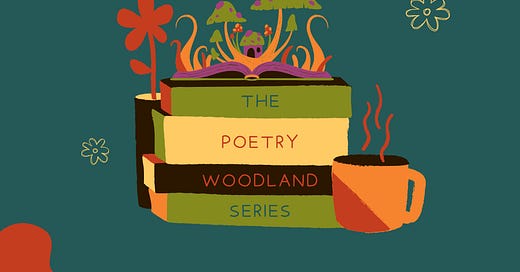The Poetry Woodland Series: "Sonnet—Baugmaree"
Public domain poetry readings & analysis. Vol. 3 | Toru Dutt's poems 🪐
Sonnet—Baugmaree*
by Toru Dutt
I apologize—there’s no audio this week! I’m still waiting for my voice to return after being very sick. Hopefully next time. 💚
A sea of foliage girds our garden round,
But not a sea of dull unvaried green,
Sharp contrasts of all colours here are seen;
The light-green graceful tamarinds abound
Amid the mangoe clumps of green profound,
And palms arise, like pillars gray, between;
And o'er the quiet pools the seemuls lean,
Red,—red, and startling like a trumpet's sound.
But nothing can be lovelier than the ranges
Of bamboos to the eastward, when the moon
Looks through their gaps, and the white lotus changes
Into a cup of silver. One might swoon
Drunken with beauty then, or gaze and gaze
On a primeval Eden, in amaze.*This poem is in the public domain!
Toru Dutt (Tarulatta Datta - Bengali: তরু দত্ত) was born on March 4, 1856, in Kolkata, India. She was an Indian Bengali poet, translator, and essayist, who wrote in English and French from British-occupied India. She is one of the founding figures of Indo-Anglian literature, alongside Henry Louis Vivian Derozio (1809–1831), Manmohan Ghose (1869–1924), and Sarojini Naidu (1879–1949). Dutt wrote several volumes of poetry in English and a novel—the first written by an Indian writer in French. Her writing explores themes of longing, loneliness, nostalgia, and patriotism. She died of tuberculosis on August 30, 1877, at age 21. Please read more about her life and work here.
“Sonnet—Baugmaree” was originally published in Ancient Ballads and Legends of Hindustan (C. Kegan Paul & Co., 1882).
I adore this delicious poem, especially after looking up a few of the words:
Baugmaree (garden)
Tamarinds (a leguminous tree with edible fruit, often described as a combination of lemons, apricots, and dates)
Seemuls (silk cotton trees with maroon flowers)
I particularly admire this line:
Red,—red, and startling like a trumpet's sound
The description of one sense via another to enunciate its impact—along with the use of the em dash and repeated word ‘red’—is stunning. The contrast of colours mirrors the contrast of senses as they bolster one another.
Honestly, when I read this line I immediately thought of the U.S. Electoral College map a few days ago. Startled (or shocked and the like) isn’t the right word or sentiment, but many other words could take its place…
I love poems that personify the moon, particularly when they imply its ability to look upon us, here on Earth. I thought of this when I looked out my window yesterday evening; it was 5:15 pm, the early sunset darkened by a storm, and yet the moon peeked through a pocket of disconnected cloud. The prevailing theory about the moon’s formation is, in fact, that it was once a piece of Earth, which reminds me of the startling poem: Facts about the Moon by Dorianne Laux.
Finally, I wonder what Dutt meant by adding the word ‘primeval’ in front of Eden. My reading is of a garden before ancient scripture—an imagining of an original, unwritten, untouched, unmanipulated, depoliticized form. Interesting to think about. Let me know if you have thoughts!






I like the idea of an Eden before scripture. It gives it an innocence and allows its beauty to be the main focal point. Instead of us unconsciously centering the humans due to the religious context of Eden, it helps us to recenter the nature 🌱